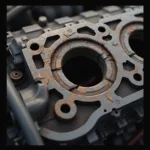When it comes to getting your car repaired, a car body repair contract is an essential document that protects both you and the repair shop. This legally binding agreement outlines the scope of work, costs, and responsibilities of each party involved. Understanding the ins and outs of this contract is crucial for a smooth and satisfactory repair experience.
What is a Car Body Repair Contract?
A car body repair contract is a formal agreement between the vehicle owner and the auto body repair shop. It serves as a roadmap for the entire repair process, clearly stating what repairs will be done, how much they will cost, and the timeline for completion. This contract protects both parties involved by minimizing misunderstandings and potential disputes.
Key Elements of a Car Body Repair Contract
A comprehensive car body repair contract should include several key elements to ensure clarity and legal protection. These elements may vary slightly depending on the state and specific repair shop, but the core components remain consistent.
1. Identification of Parties
The contract should clearly identify both the vehicle owner and the repair shop. This includes full names, addresses, and contact information.
2. Vehicle Information
Detailed information about the vehicle being repaired should be included, such as:
- Year, make, and model
- VIN (Vehicle Identification Number)
- Current mileage
- Color and any special features
3. Description of Damages
A thorough description of the damages to be repaired is essential. This includes:
- Location and extent of damage
- Parts requiring repair or replacement
- Any pre-existing damage
4. Scope of Work
This section outlines the specific repairs the shop will undertake, including:
- Parts to be replaced (using OEM, aftermarket, or salvaged parts)
- Labor required for each repair
- Paint and refinishing details
5. Repair Costs and Payment Terms
A detailed breakdown of all repair costs is crucial. This should include:
- Parts costs
- Labor rates
- Taxes and fees
- Payment methods accepted
- Payment schedule
6. Repair Timeline
The contract should provide an estimated completion date for the repairs. Factors that can influence the timeline include:
- Parts availability
- Repair complexity
- Shop workload
7. Warranties
Information about warranties covering parts and labor should be clearly stated. This includes:
- Warranty period
- Coverage limitations
- Warranty claim process
Importance of a Written Contract
Having a written car body repair contract is crucial for various reasons:
- Legal Protection: It serves as legal proof of the agreement and protects both the vehicle owner and the repair shop in case of disputes.
- Clarity and Transparency: The contract eliminates ambiguity by clearly defining the scope of work, costs, and responsibilities.
- Peace of Mind: Knowing that the repair process is documented provides peace of mind to both parties involved.
Tips for Reviewing a Car Body Repair Contract
Before signing a car body repair contract, it’s essential to thoroughly review it and ensure you understand all the terms and conditions. Here are some tips:
- Read Carefully: Take your time to read through the entire contract, paying close attention to the details.
- Ask Questions: Don’t hesitate to ask the repair shop for clarification on any terms or sections you don’t understand.
- Get Everything in Writing: Ensure that all agreed-upon terms, including verbal agreements, are explicitly stated in the written contract.
- Keep a Copy: Once you sign the contract, request a copy for your records.
Conclusion
A car body repair contract is an indispensable document that safeguards the interests of both the vehicle owner and the repair shop. By understanding its significance, key elements, and reviewing tips, you can ensure a smooth and satisfactory car repair experience. Remember, a well-drafted contract promotes transparency, minimizes disputes, and ultimately leads to a successful repair outcome.



